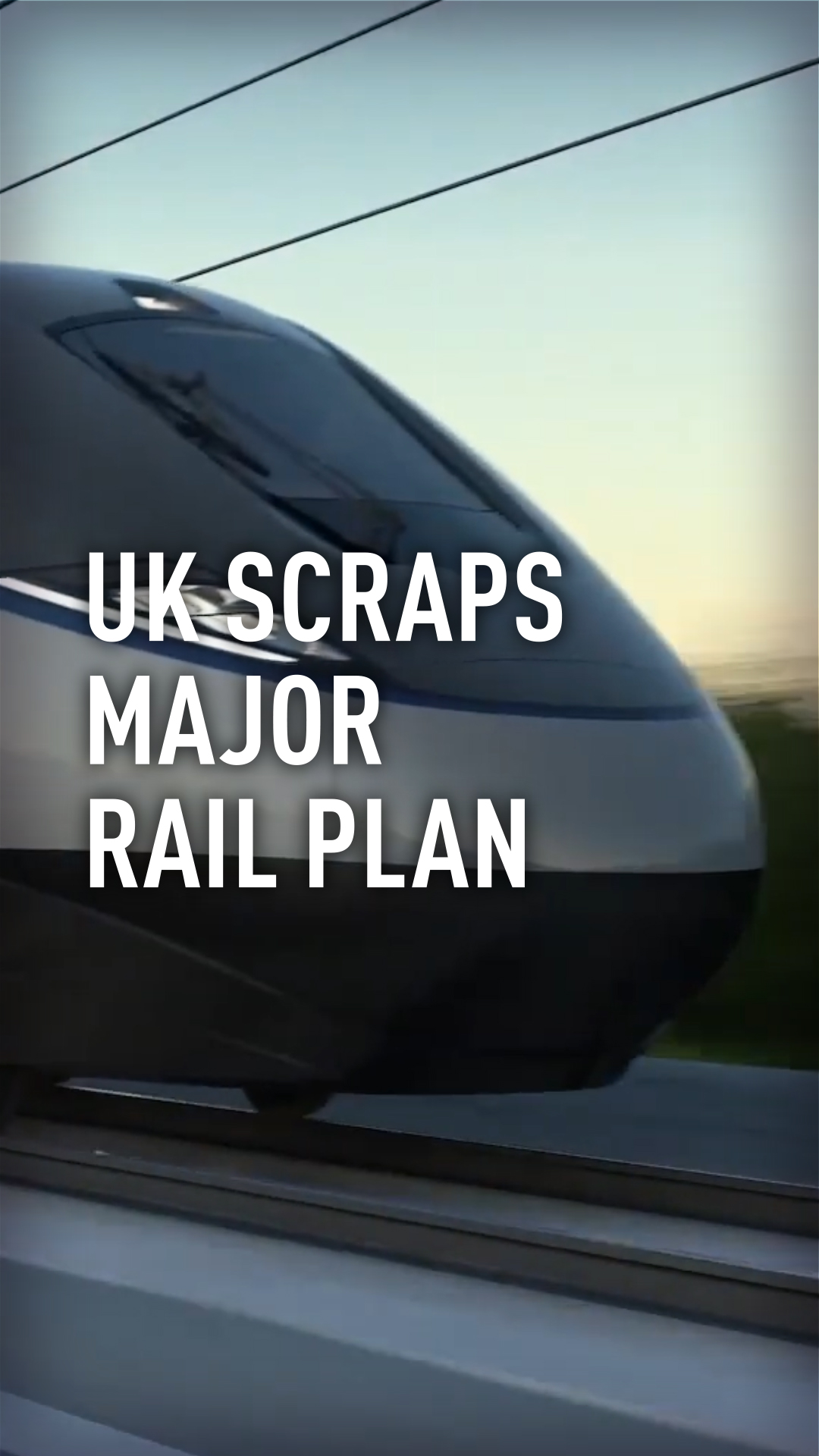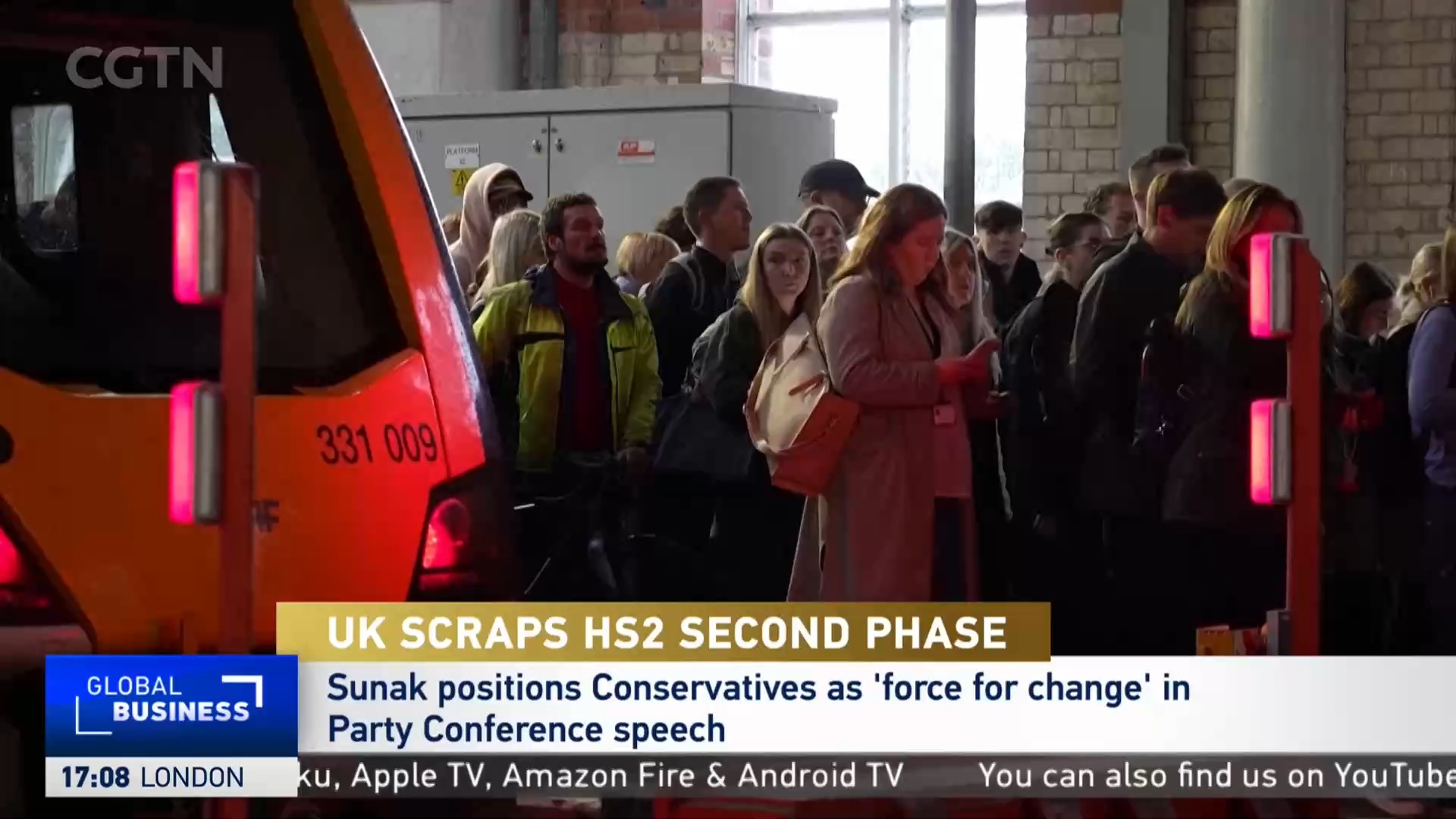01:45

The UK was at the forefront of early rail travel, with the world's first public passenger train pulled by English engineer George Stephenson's Active from Darlington to Stockton, carrying 450 passengers at 24 kmh. That was back in 1824, 60 years after Scotsman James Watt's steam engine prefaced the Industrial Revolution.
Stephenson's success was followed by the invention of the electric locomotive by fellow Scot Robert Davidson in 1837. But the rest of the world soon caught up and in recent decades investment in the UK rail industry has fallen, ever since the controversial 1963 Beeching Report led to the closure of half the country's stations.
Since then, many of those UK's rail infrastructure projects that have been completed have been hit by embarrassing cost increases and lengthy delays.
So perhaps it's no surprise that the ambitious HS2 project ran out of rail.

A road sign as HS2 construction continues last week near Amersham, UK. /Toby Melville/Reuters
A road sign as HS2 construction continues last week near Amersham, UK. /Toby Melville/Reuters
What does the H2 cancellation mean?
HS2, or High Speed 2, is a planned high-speed railway, billed as Europe's largest infrastructure project. It was originally expected to link London with the English cities to its north including Birmingham, Manchester and Leeds, with the first trains scheduled to start by 2033.
The project was designed to help modernize the rail network, slash travel times and help the UK catch up with other European nations that operate well-connected high-speed rail networks.
It was pitched as a way to reduce regional economic disparities. However, the northern section of HS2 connecting Birmingham and Manchester has been canceled, meaning the planned railway will only link London with Birmingham in central England.
A 2012 government report said HS2 could cost up to $73 billion, but its budget has repeatedly ballooned, especially with inflation, and a 2020 estimate showed costs could rise to $128.5 billion.
Prime Minister Rishi Sunak announced on Wednesday that he will redirect HS2 funding to other railway, road and bus transport projects and faster connectivity between the northern English cities of Liverpool and Manchester.

UK Prime Minister Rishi Sunak delivered the death knell for the northern leg of HS2 at Conservative Party's annual conference in Manchester. /Hannah McKay/Reuters
UK Prime Minister Rishi Sunak delivered the death knell for the northern leg of HS2 at Conservative Party's annual conference in Manchester. /Hannah McKay/Reuters
How have other multi-billion-dollar UK rail projects fared?
The UK's $18.8 bn Crossrail construction project centered around London and was eventually completed four years late in 2022, having gone almost 30 percent over budget.
London's Jubilee Line extension was also delivered late and at almost twice its original budget when it opened in 1999 at a cost of $4.25 bn.
HS1 (High Speed 1) saw the UK linking its railway to France via the Channel Tunnel Rail Link (CTRL), carrying international passenger traffic between the UK and mainland Europe. It cost a total of $8.3 bn - 18 per cent higher than the target cost – but is regarded as an economic success story.

Loading and unloading of the China-Europe freight train at the China-Kazakhstan logistics base in Lianyungang, Jiangsu. /CFP
Loading and unloading of the China-Europe freight train at the China-Kazakhstan logistics base in Lianyungang, Jiangsu. /CFP
How does the UK's rail infrastructure record compare to its neighbours?
In a study released in August, growth campaign group Britain Remade suggested that even if the 2013 estimate for HS2 had been correct "it would still be more than double the price Italy is paying to build a high-speed connection between Naples and Bari. It would also be 3.7 times more expensive than France's high-speed link between Tours and Bordeaux."
Excavation work is underway on the Naples-Bari connection and is believed to be making good progress.
Other recent European railway projects have proved less successful. Germany's Stuttgart 21 was first announced in 1994 but construction was delayed until 2010 and won't be complete until at least 2025, with the estimated $4.75 bn price tag reportedly spiralled to around $8 bn.
A scathing 2020 European Court of Auditors report revealed that eight multi-billion-euro infrastructure projects were behind schedule and over budget. This included four railway building works, such as the Rail Baltica high-speed link between the Baltics and the rest of Europe. The report suggested the link may not be economically viable because of the lack of surveys on potential passenger and freight demand.
A new Chinese-backed high-speed rail line between Belgrade and Budapest looks likely to prove a better bet, cutting rail travel times between the European capitals by more than half, while boosting passenger numbers threefold. However, construction work was recently suspended over difficulties meeting EU security standards.
Across China, multiple China-Europe freight trains made their maiden journey this year. A ten-day 7,855 kilometer journey from Xi'an in central China to the world's largest inland port in Duisburg, Germany has been hailed as a remarkable achievement.
03:51

Does the UK have any mitigating circumstances?
Leading British transport commentator Christian Wolmar believes the UK does face specific challenges. He told CGTN: "The reasonable excuse is that we are a small, very crowded country and it's quite difficult to put through a new line with all the houses and factories and whatever else there is in the way. There's a lot of people who protested about it, so the line actually got put into tunnels and viaducts in many places, which is extremely expensive."
But he added: "The scandalous aspect is that the project management has been terrible. They've never managed to get a grip on the costs."
Wolmar thinks the UK is paying the price for decades of underinvestment. "Lots of countries have high speed networks and indeed, in China, they're heading towards 40,000 kilometers of a high speed line. Other countries - Spain, Italy, France, have all got burgeoning networks and we're somewhat left behind in this."
He argues that the UK already has a good existing rail network and questions the original rationale behind HS2. However, he believes scrapping the scheme is a mistake.
He insisted: "It might well have been a mistake to have started it but once you start something like this, you shouldn't give up halfway because it looks bad reputationally for the nation. It looks bad to the people who were promised this scheme and it just wastes a vast amount of money."

Subscribe to Storyboard: A weekly newsletter bringing you the best of CGTN every Friday
Source(s): Reuters